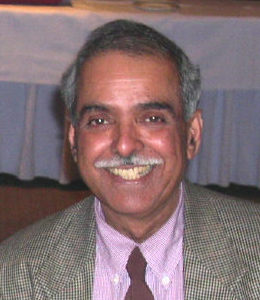Posted on : Oct.21,2006 09:51 KST
Modified on : Oct.30,2006 15:21 KST
Vipan Chandra, Professor of History at Wheaton College, U.S.
It is quite common among right-wing Washington "strategists" and pundits to describe the North Korean government as a bunch of madmen led by a buffoon, when many informed and objective analysts see them as quite rational actors trying hard against grave odds to ensure their state's security and survival. Consider that it was the United States of America that used nuclear weapons twice in World War II(the victims included 20,000 Korean residents of Hiroshima) and also seriously contemplated using them--until saner counsels prevailed, due to fears of potential confrontations with China and the Soviet Union--in the Korean and Vietnam wars. Consider further that through covert subversion, actual and unsuccessful assassinations, and lethal invasions, Washington has frequently overthrown or tried to overthrow regimes in Central America, South America, Asia, and the Middle East. These were often unilaterally defined by the U.S. as "evil" or " hostile" to American interests. America can ,of course, claim credit for just intervention in the Korean War, for while there were plenty of fatal provocations from both sides in that conflict,the war itself was initiated by North Korea with Soviet encouragement. Similarly, the U.S. intervention in Afghanistan can be justified on morally sound grounds as it was designed to destroy the sanctuaries of Al Qaeda, the sponsoring body of 9/11 mass murderers. Yet such instances have been few and far between compared to the more egregious acts of American aggression.
Against this background, should it be surprising that in recent years North Korea has sought to bolster its chances for survival, by however slight the margin and by however rash the calculation, through the development of nuclear weapons? They seem to have become the only meaningful bargaining chips for some beleaguered states in our cynical international politics, under which the existing nuclear powers "club" hypocritically denounces any new gate-crasher without working toward universal nuclear disarmament. (In this hypocritical chorus, Pakistan should take the cake, for it was its scientist A.Q. Khan, celebrated in the country as a "national hero," who, under the Pakistani government's ever watchful eyes, sold nuclear proliferation technology to Libya, Iran, and North Korea. The Pakistani government now calls him a "rogue" scientist working on his own, but that is like an urban trickster trying to sell the Brooklyn Bridge to a country simpleton visiting New York.).
An important salient fact about North Korea is that though developing its nuclear potential, for more than a decade North Korea has actively pursued avenues toward diplomatic recognition and economic and energy assistance from, and a non-aggression pact with, the US. In addition, as Peter Hayes, a distinguished expert on security and sustainable development in Northeast Asia, points out in an article posted on October 4 in Japan Focus,an internet journal, Pyongyang also has its anxieties about being surrounded by Russia, China and Japan as well as some fear of its more powerful and affluent kin in South Korea. To create some balance against them, North Koreans have even shown a desire in the past to cultivate "distant great-power" ties, only to be rebuffed with disdain.
In a play on the theme "from swords to plowshares", Kim Yong-sun, a high-level nuclear strategist of North Korea, mentioned to Hayes in 1993 the Korean saying "sword to sword, rice cake to rice cake". "It is time", Kim added, "to throw away the swords and hold up the rice cakes." The challenge before the Bush administration is to grasp the wisdom of that statement, alter Washington's own menacing words and actions, and through treaties and conventions, assure North Korea that, despite radical ideological differences with it, America means no harm to the country but wishes to work toward a cordial co-existence with it. It is quite likely that to these "rice cakes" from Washington, the currently poverty-stricken North Korea will reciprocate with its own variety. In Korea's Confucian heritage, reciprocity has long been held as a prime virtue in human relationships. Let's not contemptuously brush aside such ideas as a pipe dream.
To salvage peace, security, prosperity, and dignity for all involved, there is no alternative to a global version of what some Indian social activists are now trying to revive in their country: the lost and forgotten outlook of "Gandhigiri." It stems from the Gandhian philosophy of non-violence, goodwill, and mutual acccomodation, as opposed to bluster,confrontation and violence, in solving problems. The U.S. and its supporters have an opportunity to defuse the North Korean crisis and lay the foundations for an enduring Northeast Asian and global peace by establishing an international diplomacy of Gandhigiri. Coming from enormous collective strength represented by its Security Council supporters, such a U.S.-led approach to North Korea has the potential not only to transform Pyongyang but also help Washington itself recover its long-lost role of enlightened leadership in global affairs. Here is one approach where Confucius, Gandhi and Christ can all be harnessed for the benefit of all humanity.






